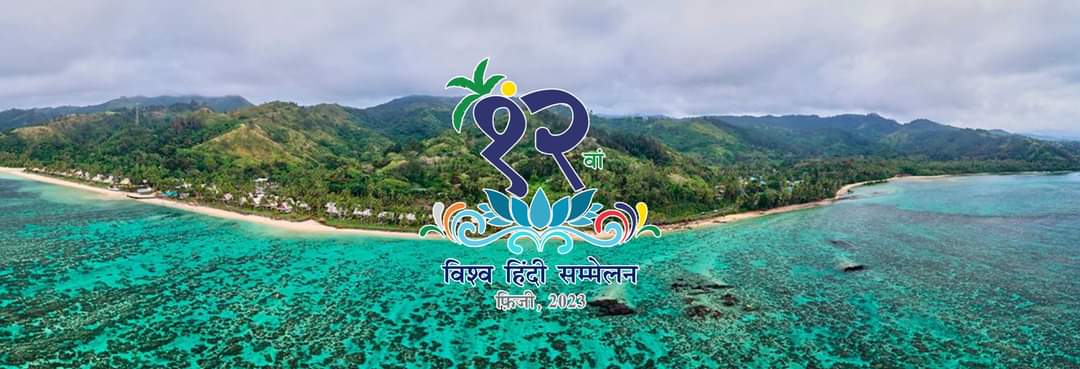

Fiji will host the 12th World Hindi Conference on February 2023
Although international politics is often shaped by the activities of major powers, strategically located small states matter a great deal for global politics. Major powers routinely seek to acquire military facilities/bases in smaller states to project their power. The South Pacific region is home to such strategically-important-yet-smaller-in-size archipelagic states where major powers are competing for influence.
In fact, the South Pacific has emerged as one of the most important strategic theatres in the broader Indo-Pacific region. The region has been in the news this year for the consistent and assertive attempts by China to gain a strategic foothold and expand its influence. China has aggressively sought to engage the smaller Island states and has challenged Australia and New Zealand, the traditional regional powers, in their own backyard. Given the seriousness of the Chinese challenge, the Quad summit in Tokyo earlier this year had a detailed paragraph about the region.
In this context, India is demonstrating incremental interest to mark its presence in the region. The 12th World Hindi Conference will be held in Fiji in February 2023. About 37% of Fijian population is of Indian origin and the Indian diaspora has been a key factor shaping Indo-Fiji ties. The country had hosted the first summit between India and the Pacific Island States in 2014.
Fiji has also been one of the founding members of the US-led Indo-Pacific Economic Framework (IPEF). The IPEF is an attempt by the US to re-enter the region and play a prominent role in the economic future of the Indo-Pacific. The US has been missing from the regional economic landscape, at least since the withdrawal from the Trans-Pacific Partnership in January 2017.
Meanwhile, despite the Covid-19 pandemic, rising global energy prices and the slowing economy, China remains a major economic and investment partner for the region. Therefore, having a key Pacific Island state in the US-led economic initiatives is a positive signal.
Besides, India recently held, first foreign office consultations (FOC) with Papua New Guinea (PNG). FOCs are generally held at the level of officials and act as a key input feeder for the foreign policy bureaucracy.
The PNG, the third largest Island country in the world, is located at the crossroads of Australia and Indonesia, the two regional giants. More importantly, it neighbours Solomon Islands, the state which shot to prominence for its growing closeness, especially in the domain of security, to China. India’s engagement with the PNG is important in view of sharpening strategic rivalries in the Indo-Pacific region.
As per India’s Ministry of External Affairs (MEA) press release, the consultations “reviewed the entire gamut of bilateral relations”. The two sides “exchanged views on regional and global issues”. One would like to believe that issues such as the US-China strategic rivalry, challenges of maritime security, effects of climate change and the development of the blue economy would have figured in these discussions.
Although India engaged South Pacific leaders on the side-lines of the United Nations General Assembly in September 2019, the third FIPIC summit has not taken place since the second, Jaipur summit in 2015. Therefore, the reference to the third summit in the MEA press release is significant. It noted that India and PNG “discussed the joint hosting by the two countries of the 3rd Summit of the Forum for India-Pacific Islands Cooperation (FIPIC) to be held in Port Moresby”.
The evolving geopolitics and geoeconomics of the Indo-Pacific region is making smaller Island states of South Pacific, at once, important, and yet vulnerable. Many of these countries are in the state of flux as the strategic rivalries are being played out in their domestic politics. The competition for recognition and influence between China and Taiwan is a key factor in the internal politics of Solomon Islands whereas Bougainville seeks to achieve independence from the PNG. A section of population in the French territories in the South Pacific have been demanding independence from France as well.
In view of the intensifying strategic rivalries in the Indo-Pacific region, small Island states of South Pacific have been bestowed with greater diplomatic choices. India could perhaps leverage the quest of these Island states for diversifying their foreign and strategic policy partners. As India struggles to be an attractive economic partner for the Indo-Pacific region, expanding India’s development assistance as well as naval footprint in the region would be a good way to start. It will not only help India in expanding its influence but also limit the growing Chinese challenge.
Also Read: India reaches out to Pacific island nations as part of new Indo-Pacific strategy
(Sankalp Gurjar is an Assistant Professor at the Department of Geopolitics and International Relations, Manipal Academy of Higher Education. He specializes in Indo-Pacific security, South Asian geopolitics and Great Power Politics)
India's coal imports fell by 7.9 per cent, totalling 243.62 million tonnes (MT), compared to…
At least 88 illegal Bangladeshi migrants have been traced and detained by teams of South…
Japan has accused China of conducting maritime scientific research without prior notification within its exclusive…
Indian businesses are aiming exports to the tune of USD 1 trillion in the current…
Border Security Force (BSF's) Assistant Commandant Neha Bhandari commanded a forward post along the International…
The French Ambassador for the Ocean and French President's Special Envoy for the United Nations…